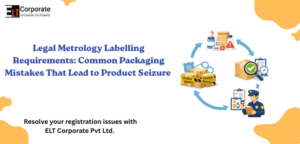In India Legal Metrology vs BIS regulatory compliance is the cornerstone of consumer protection, product quality and fair trade. Two of the most important structures are with the Legal Metrology Act, 2009 (with the Packed Commodities Rules, 2011) and the Bureau of Indian Standards (BIS) Act, 2016. While the aim is to protect consumers and separate market transparency, their scope, procedures and compliance requirements.
This guide explains the difference between legal metrology and BIS, their roles in consumer protection and how the business can remain according to businesses.
Legal Metrology vs BIS: Why Understanding the Difference Matters
For businesses, compliance with both frameworks is not optional – this is mandatory. Knowing their differences helps in companies:
- Avoid overlapping punishment.
- Ensure smooth operation in industries.
- Create trust and reliability with consumers.
- Get a competitive lead in regulated markets.
Scope of Legal Metrology vs BIS
| Aspect | Legal Metrology | BIS (Bureau of Indian Standards) |
| Focus Area | Accuracy in weights, measures, and labelling of goods | Product quality, safety, and standardization |
| Governing Law | Legal Metrology Act, 2009 & LMPC Rules, 2011 | BIS Act, 2016 |
| Authority | Controller of Legal Metrology (State & Central) | Bureau of Indian Standards (BIS) |
| Applicable To | All businesses selling/using measuring instruments or packaged commodities | Manufacturers, importers, and sellers of notified products under Quality Control Orders (QCOs) |
| Compliance Focus | Fair trade, transparency, accurate quantity | Product certification (ISI mark, CRS, Hallmarking) |
| Key Outcome | Consumer protection from fraud or misrepresentation | Consumer safety and assurance of product quality |
Step-by-Step: Legal Metrology Compliance
Step 1 – Registration
Obtain LMPC Certificate (importer/manufacturer).
Step 2 – Labeling Compliance
Ensure packaging declares: net quantity, MRP, expiry, manufacturer/importer details.
Step 3 – Calibration & Stamping
Weighing/measuring instruments must be verified and stamped periodically.
Step 4 – Inspections
Surprise audits by Legal Metrology authorities at markets, fuel stations, factories.
Step 5 – Grievance Handling
Maintain consumer complaint registers and respond to violations promptly.
Step-by-Step: BIS Compliance
Step 1 – Identify Applicable Standard
Check if your product is covered under a BIS Quality Control Order (QCO).
Step 2 – Testing & Certification
Get the product tested in BIS-recognized labs. Apply for certification (ISI, CRS, or Hallmark).
Step 3 – Factory Inspection
BIS officers may inspect manufacturing facilities before granting a license.
Step 4 – License Grant
Once approved, you can use the ISI mark or CRS mark.
Step 5 – Renewal & Surveillance
Licenses are renewed periodically, and BIS conducts follow-up inspections and product sampling.
Penalties for Non-Compliance
- Legal Metrology:
- Fines up to ₹1 lakh and imprisonment (Sections 25, 36).
- Seizure of non-compliant goods.
- BIS:
- Selling non-certified products under mandatory QCOs can lead to fines up to ₹5 lakh.
- Imprisonment up to 2 years for serious violations.
Who Needs Legal Metrology vs. BIS?
- Legal Metrology:
- Retailers, wholesalers, importers, e-commerce platforms, hospitals, fuel stations.
- BIS:
- Manufacturers/importers of electricals, electronics, medical devices, steel, cement, gold jewelry, and other products notified under QCOs.
- Manufacturers/importers of electricals, electronics, medical devices, steel, cement, gold jewelry, and other products notified under QCOs.
How ELT Corporate Supports Businesses
At ELT Corporate, we simplify compliance by offering:
- LMPC Registration & Label Verification – End-to-end support for importers and traders.
- BIS Certification Assistance – From application to product testing and license grant.
- Audit & Inspection Readiness – Helping businesses prepare for authority checks.
- Legal Advisory – Handling disputes, penalties, and notices under both frameworks.
- Training & Documentation – Educating staff on packaging, labeling, and certification.
FAQs
Q1. Do I need both LMPC and BIS?
Yes, if your product is both packaged (requiring LMPC compliance) and falls under BIS QCO for quality certification.
Q2. What’s the difference between ISI and LMPC?
- ISI is a BIS quality mark showing product safety and standard compliance.
- LMPC ensures accuracy in quantity/measurement and proper labeling.
Conclusion
While both legal metros and BIS aim to protect consumers, they focus on various aspects – product quality accuracy vs. product quality. For businesses, both compliance is not only about avoiding punishment-it is about faith, credibility and long-term development.
Need specialist assistance with BIS and legal metrology compliance?
For complete solutions, contact the ELT corporate today that protect your brand and create consumer trust.








